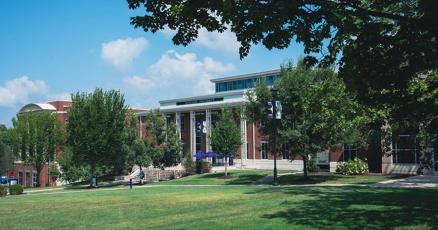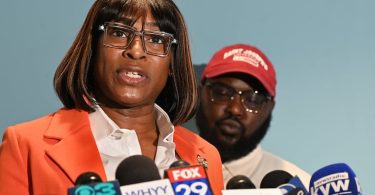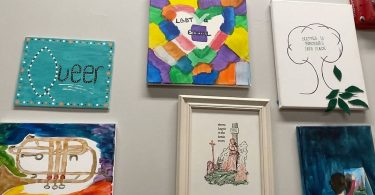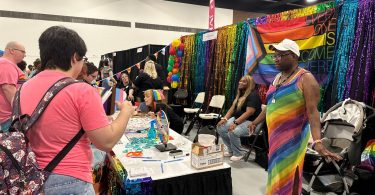Members of the Lipscomb University community are grappling with the institution’s identity — and their place in it — following a statement that appeared on its website earlier this year. Found among seven other tenets on the “Heritage” section of the private university’s “What We Believe” webpage, the statement addresses the institution’s belief around “A Commitment to God’s Design for Marriage.” It states:
“We believe that from the beginning God designed marriage as a covenant between one man and one woman, which is affirmed by Jesus in the New Testament, and that God’s design is for sexual intimacy to occur in the context of that covenant. In this affirmation, we stand both in the modern heritage of Churches of Christ and of the two-thousand-year-old Great Tradition of the faith.”
Who specifically is responsible for writing the statement is unclear. A note at the bottom of the site says the tenets were approved by the university’s board of trustees in February 2018 and amended in April of this year. In August, right-wing site The Tennessee Conservative published a short article telling readers to expect pushback from LGBTQ groups over the statement. A university representative who spoke to the Scene declined to provide an official statement on the matter or share who is responsible for writing the statement or bringing it to the board.
Lipscomb is a private, conservative Christian university. Some say students who don’t like the school’s tenets don’t have to attend. The statement is not a policy — LGBTQ students and non-Christian students are allowed to enroll at Lipscomb. Critics worry it could cause harm to Lipscomb’s LGBTQ students, deter prospective students from enrolling or amplify anti-LGBTQ sentiments on campus.
“The content of it is not surprising based on our history and our tradition up until now,” says a faculty member who spoke to the Scene on the condition of anonymity, fearing retribution. “What is the surprise is the need for it.”
The faculty member tells the Scene that while Lipscomb’s viewpoints have remained steady over the decades, those beliefs haven’t been publicized heavily in recent years, which created a more welcoming environment for LGBTQ students. The faculty member has noticed a “spectrum” of reactions from fellow employees, and would personally like to see the statement taken down. The reason: Young LGBTQ people experience high rates of self-harm and suicide attempts. The faculty member doesn’t want to see the statement exacerbate hardships among the student body.
“When you put the label ‘Christian university,’ there’s some models that say, ‘We’re going to indoctrinate you with what Christianity is and expect you to follow that,’” says the faculty member. “There are other schools of thought that say, ‘We’re a Christian university, we’re going to expose you and introduce you to the Christian perspective and worldview and the great tradition of Christian scholarship and invite you to participate in that.’ I feel this statement doesn’t allow for the freedom of invitation but more of indoctrination.”
The climate that led to the statement has also led some employees to leave the university.
Dana Chamblee Carpenter is a former English professor who worked at the university for 24 years. She left at the end of the semester in April. Though she wasn’t aware of the statement’s existence when she left, Carpenter tells the Scene that she “knew something like this was coming,” and “the attitudes that led to the statement … were part of the impetus for me leaving.” She cites issues with pay inequity as another contributing factor in her decision.
“I felt like I had to walk away and not be responsible for continuing to draw students into an environment where I don’t think they can thrive,” says Chamblee Carpenter.
Chelsea Flowers is another former staff member (and alumna) who left the university in 2023. She realized she was a member of the LGBTQ community while working there. Between her identity, issues with pay and issues with a building where she worked, Flowers decided to leave.
“There was a ton of grief to leave this department that I really loved, and that I found a home in,” says Flowers. “I discovered who I am working there.”
Flowers says she knows of two other LGBTQ professors who also left.
“When you choose to go to Lipscomb, you do so knowing that they are a Church of Christ institution and that they have rules and beliefs that align with the conservative and traditional Church of Christ belief,” says Flowers. “And by choosing to go there, you are choosing to sort of live and function under that umbrella. But that is at the institutional level — that is not what you will find on the ground.”
Rachel Randolph is a 2023 Lipscomb graduate who realized she was gay while attending and says her professors fostered “a community of inclusivity.” Randolph has been vocal about the statement, highlighting it on social media, meeting with university officials and creating a Change.org petition to have it removed. She tells the Scene she believes the statement is “antithetical,” to the university’s diversity statement, especially knowing how many LGBTQ students attend the university.
“I do not like that this is who Lipscomb is,” says Flowers. “I don’t agree with it, but it’s not black-and-white. There’s a lot of gray.”







